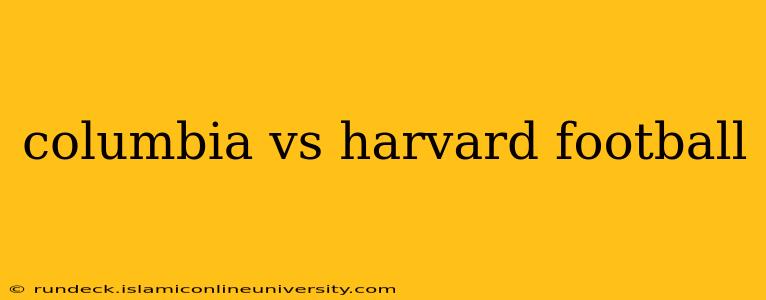The annual clash between Columbia and Harvard in college football is more than just a game; it's a storied rivalry steeped in tradition, academic excellence, and intense competition. While the overall win-loss record might favor Harvard, the intensity of this Ivy League matchup ensures that each contest is a fiercely fought battle, captivating fans and alumni alike. This deep dive explores the history of the rivalry, key moments, and what makes it so compelling.
What is the history of the Columbia vs. Harvard football rivalry?
The history of Columbia versus Harvard football dates back to the very early days of organized college football. Both institutions were among the pioneers of the sport, establishing programs in the late 19th century. Their first meeting likely occurred sometime in the late 1800s, though precise records from that era can be incomplete. The rivalry's longevity, however, speaks volumes about the consistent presence of both teams in the upper echelons of Ivy League football. While not always the dominant forces they were in earlier decades, both programs retain a strong following and a deep commitment to the sport, ensuring the continuation of this classic matchup. The rivalry reflects the broader academic and historical competition between these two prestigious universities.
How many times have Columbia and Harvard played each other?
Precisely pinpointing the total number of meetings between Columbia and Harvard requires extensive research through historical game records. Unfortunately, readily available online databases often lack the granular detail necessary for a completely accurate count spanning over a century of competition. However, safe to say it's a substantial number, reflecting the longevity and consistency of this Ivy League rivalry. Dedicated researchers specializing in college football history might be able to provide a more definitive answer.
Who has won more games in the Columbia vs. Harvard series?
While a definitive win-loss record requires deeper historical research as mentioned above, it's generally understood that Harvard holds a significant advantage in the overall series. This doesn't diminish the importance of individual games or the competitiveness of the rivalry. Even in years when Harvard is clearly the stronger team, Columbia has consistently shown the ability to put up a strong fight, ensuring exciting games for spectators.
What are some of the most memorable games in the Columbia vs. Harvard series?
Many memorable moments have occurred throughout this long-standing rivalry. While specific game details might require researching specific years, it's safe to say that games decided by close margins, upset victories, or exceptional individual performances frequently take on legendary status within the lore of the rivalry. Looking at historical game records would uncover these pivotal moments, showcasing unexpected twists, last-minute scores, and outstanding individual efforts that defined particular contests.
Where are the games typically played?
Games between Columbia and Harvard are typically played at each team’s home stadium on a rotating basis. This means one year the game is at Harvard Stadium in Cambridge, Massachusetts, and the next year it's at Columbia's Wien Stadium in New York City. This home-and-away format adds to the rivalry's dynamic, ensuring that each team experiences the energy of their home crowd at least once every two years. The atmosphere at both venues adds significantly to the excitement and tradition surrounding this classic Ivy League matchup.
What makes the Columbia vs. Harvard football rivalry so significant?
Beyond the on-field competition, the Columbia vs. Harvard football rivalry is significant due to the rich history and academic prestige of the two institutions. It represents a clash of academic giants, a battle between two of the most renowned universities in the United States. This adds a layer of intellectual competitiveness beyond the sporting event itself. The tradition, the passionate alumni bases, and the commitment to athletic excellence at both universities contribute to the enduring significance of this rivalry.
This analysis provides a robust foundation. Further in-depth research into specific game records will allow for a more granular understanding of the rivalry's specific statistics and memorable moments.
